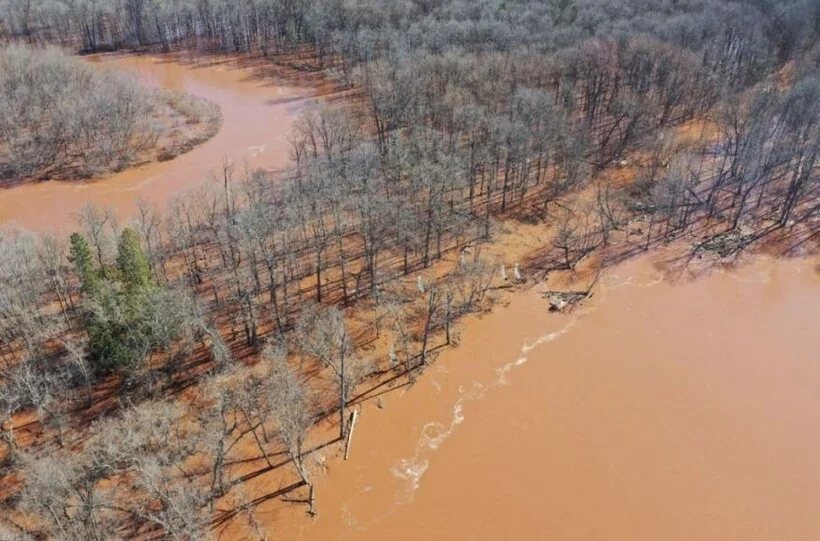We have much more to do and your continued support is needed now more than ever.
Bad River Band Responds to Line 5 Shutdown Order

Court orders Line 5 to cease operation within the Bad River Band of Lake Superior Tribe of Chippewa Indians’ Reservation in three years
A federal court on June 16th ordered Canadian oil giant Enbridge to cease the flow of oil and to decommission within three years the segment of its Line 5 pipeline that is trespassing on the reservation of the Bad River Band of Lake Superior Chippewa Indians.
“The Band appreciates the Court putting an end to Enbridge’s flagrant trespass and disregard for our rights. Tribal sovereignty prevailed over corporate profits,” said Mike Wiggins, Chairman of the Bad River Band.
“But the Band’s victory is not a cause for unqualified celebration. We are under no illusion that Enbridge will do the right thing. We expect them to fight this order with all of their corporate might. This is just one step in protecting our people and water.”
Enbridge Ordered to Shut Down Work on Bad River Band Land
Last September, Judge William Conley of the US District Court of the Western District of Wisconsin held that Enbridge is in trespass on the Band’s reservation. In last week’s order, he further held that the Line 5 pipeline poses a public nuisance to the Bad River and Lake Superior.
In addition to ordering a shutdown and decommissioning of the pipeline within three years, Judge Conley also ordered Enbridge pay the Band a portion of the profits it earned for the 10 years it was in trespass.
“We are heartened that the Court correctly held that Enbridge cannot continue its trespass on the Band’s lands indefinitely, and we appreciate the care and attention the Court has put into the case,” said Erick Arnold, Attorney for the Band.
“But we disagree with several aspects of the Court’s order. The three-year timeline leaves the Bad River vulnerable to catastrophe, and there is no warrant for allowing Enbridge’s trespass to continue for that long. And while the Band’s motivations have never been about money, such a small award for a decade-long trespass during which Enbridge earned over a billion dollars in net profits from Line 5 will not sufficiently deter trespassers like Enbridge, but will instead create an incentive for corporations to violate the sovereignty of the Band.”
Enbridge Must Pay Bad River Band
In 2019, the Bad River Band sued Canadian oil giant Enbridge in federal court to shut down and remove the Line 5 oil pipeline from its reservation. In 2013, numerous easements that the United States granted in the 1950s to allow Line 5’s construction on the Band’s reservation expired, and the Band declined to renew them.
Judge Conley ruled last year that Enbridge is consciously trespassing on the Reservation and profiting at the Band’s expense, and has now ordered Enbridge off the Band’s sovereign lands and to pay the Band $5 million. The Court also held that Enbridge’s Line 5 constitutes a public nuisance.
Valuable Ecosystem at Risk
The Bad River, which flows through the Reservation and into some of the most valuable wetlands in the world at the Lake Superior coastline, has been naturally meandering in the floodplain near the buried pipeline.
The Bad River is an incredibly healthy system, supporting the health of fish migrations in the spring, the life cycle of wild rice in downstream coastal waters, Lake Superior’s fisheries, and flood protection for local communities.
The Court agreed with the Band that there is an imminent risk that Line 5 will be exposed and rupture, causing a catastrophic oil spill. The Court ordered Enbridge to adopt a more conservative shutdown and purge plan for its remaining time on the Reservation.
Enbridge is responsible for the million-gallon oil spill into the Kalamazoo River in Michigan in 2010, which remains one of the largest inland oil spills in American history.
About the Line 5 Pipeline
Owned and operated by the Canadian energy giant Enbridge Energy, Line 5 carries petroleum products from tar sand deposits in Western Canada (and elsewhere) through Wisconsin and Michigan to a refinery in Sarnia, Ontario, where most of the product continues on to refineries and export from Montreal.
The original lifespan of this pipeline was 50 years—it is now 20 years beyond its expected term of service. The inland sections of Line 5 have leaked at least 33 times along its route since 1968, discharging more than 1.1 million gallons of oil.
For more information, please contact:
- Anna Marie Zorn, National Wildlife Federation, (734) 887-7136, ZornA@nwf.org
- Timna Axel, Earthjustice, (773) 828-0712, taxel@earthjustice.org





















